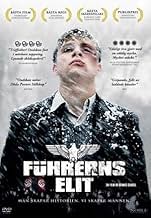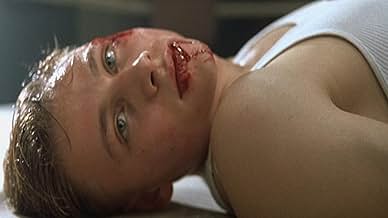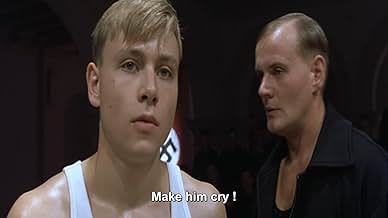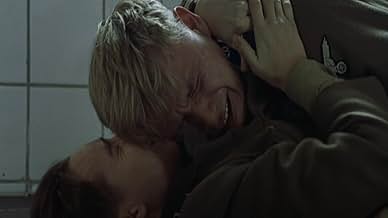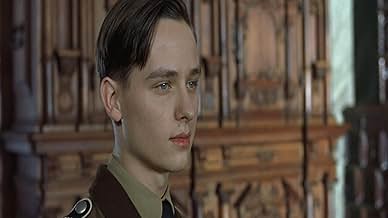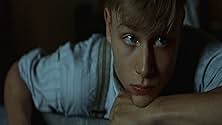Napola - Elite für den Führer
- 2004
- 1h 50min
Las habilidades de Friedrich en el boxeo le llevaron a una escuela secundaria nazi de élite en 1942. Se matricula en contra de los deseos de su padre, que le promete un futuro mejor. Pero no... Leer todoLas habilidades de Friedrich en el boxeo le llevaron a una escuela secundaria nazi de élite en 1942. Se matricula en contra de los deseos de su padre, que le promete un futuro mejor. Pero no es lo que esperaba.Las habilidades de Friedrich en el boxeo le llevaron a una escuela secundaria nazi de élite en 1942. Se matricula en contra de los deseos de su padre, que le promete un futuro mejor. Pero no es lo que esperaba.
- Dirección
- Guionistas
- Elenco
- Premios
- 8 premios ganados y 6 nominaciones en total
- Tjaden
- (as Leon Alexander Kersten)
- Gauleiter Heinrich Stein
- (as Justus von Dohnàny and Justus von Dohnányi)
- Katharina
- (as Julie Marie Engelbrecht)
- Hans Weimer
- (as Max Dombrowka)
- Dirección
- Guionistas
- Todo el elenco y el equipo
- Producción, taquilla y más en IMDbPro
Opiniones destacadas
The movie itself has a lot in common with 'Dead Poet's Society', ergo the journey of self-discovery and one's place amidst the strict paradigm of expectancy. Complete with tragedy and the strong hint of insidious cruelty, Napola is not a superficial standardised 'Hollywood' outing (thank goodness).
The facts at the end of the movie were amazing in their ability to encapsulate the futility and warn against brainwashing of a nation. May more people be aware of this practice so the 'real' terror be rightfully and publicly rebuked.
I saw this film at the 2005 Palm Springs International Film Festival at a "Best of Fest" special showing. It certainly should be a candidate for an academy nomination as "Best Foreign Language Film" but I do not know if it has a distributor for North America. It reminded me somewhat of a 2003 Palm Springs festival entry - EVIL/ONDSKAN (Dir. Mikael Hafstrom/Sweden) - which also packed an emotional kick in the gut that left me stuck in my seat for at least five minutes after the film had ended. Napola is the better of the two films by far. Great acting, script, direction, music, etc. See it on a big cinema screen if at all possible since film makes great use of the colors that will not have a similar impact in a video format.
Based on the recollections of his grandfather, Dennis Gansel's Before the Fall (Napola Elite für den Führer) is a riveting coming of age story about the training of one such Nazi elite in the Germany of 1942. The work transcends its limitations as a genre film to tackle a more universal theme - the struggle between external ideals and matters of inner conscience. Like Igor, the idealistic teenager in Dardenne's La Promesse, Friedrich Weimer (Max Riemelt), a Nordic-looking, working class boxer must deal with issues of conscience in an environment that is anathema to the assertion of human values. Friedrich is only seventeen when he is approached after an amateur boxing match by a Nazi instructor at a Napola school. Seeking to salvage the athletic reputation of the school, he sees in Freidrich not only a boxing champion, but a blank slate that can be molded to fit the Nazi ideal.
Friedrich, destined to follow his father as a factory laborer, sees the chance to both serve the fatherland and advance his own career and signs his own registration papers when his father refuses to agree. The boy is still very innocent but genuinely idealistic and possesses genuine warmth as shown in the scene in which he reassures his younger brother. Friederich's mind is open to the Nazi indoctrination not because he is without conscience but because he simply hasn't seen any reason to question the prevailing zeitgeist.
Freiderich's limited world experience suddenly expands, however, when he meets two other classmates: Siegfried Gladen (Martin Goeres), a boy who has a bed-wetting problem ruthlessly exploited as weakness by his fellow cadets and their sadistic teachers, and Albrecht Stein (Tom Schilling), the son of Heinrich Stein (Justus Vob Dohnanyi), a hateful Nazi governor. Albrecht who has the dangerous idea that people should consult their own conscience before blindly following orders is a boy of sensitivity and poetry, the embodiment perhaps of the true German spirit of Goethe and Heine. His father is revolted, however, by the boy's perceived weakness and humiliates him by insisting that he and Freidrich engage in a very uneven boxing match when he invites his friend to his home.
Albrecht begins to question the merciless Nazi training after he sees Freidrich deliver a blow to the head of a fighter when he is already down. He also recoils in horror and speaks out publicly after the cadets are marched out into the forest to track down and murder allegedly escaped Russian POWs, in reality unarmed children. This incident results in a break in the relationship of the two boys and a sudden but predictable tragedy.
Before the Fall is more than an accounting of the Nazi's disregard for human values, a fact already well-established. It is a more profound statement of how people need to be educated to think for themselves and take a stand for what they believe to be right. Impeccably directed and beautifully performed, Before the Fall is one of the most powerful and disturbing films of recent memory.
Friedrich Weimer (handsome and talented young Max Riemelt) comes from the lower class in Germany (his father is aiming him toward factory work) and is a fine young boxer. His talents are noted by some representatives from the Nazi party and he is asked to report for enrollment in a Napola, an important means of education and training that Friedrich sees as being his way to become something special, someone important. His father is anti-Nazi and refuses to let Friedrich go, but Friedrich is determined and runs into the night to join the Napola. Once there he is admitted, groomed as a boxer for the Napola, and introduced to the Hitler's youth movement. His fellow classmates vary from the very wealthy to other fine Arian lads. They are trained, observed, and brainwashed as to the glory of the Thousand Year Reich. Problems begin to arise when Friedrich gets to know his fellow classmates: Siegfried (Martin Goeres) is a bed wetter and is humiliated publicly for his problem; Albrecht (Tom Schilling) is a poet and writer whose father is one of the governors of the Napola and Albrecht is anti-war; other lads seem on the surface to be obedient yet most have hidden reservations about what they are doing.
Being 1942 some changes are occurring in the Nazi dream and the Senior class is sent out on a mission to fight the enemy. And one night Friedrich's class is called out of bed and sent into the woods to find Russian soldiers who are 'threatening' their security. The boys open fire on the Russians only to find that they have killed a number of unarmed Russian boys. This profoundly disturbs them all, but Albrecht in particular. Friedrich continues to observe the manner in which he and the other boys are used and slowly his best friends find ways to martyr themselves and ultimately Friedrich does the same in his only way - by changing the way he approaches the Napola expectations of his boxing.
Max Riemelt as Friedrich is outstanding: not only does he have the solid extraordinary good looks but he also can act, satisfying every nuance of this challenging role. The remainder of the cast - both young boys and the adults running the Napola - are superb. The cinematography is subtly beautiful, ranging from the tough interiors inside to the vistas of a Germany before it was destroyed by the not too distant fall. Director Dennis Gansel, who co-wrote the script with Maggie Peren, is a young man (the featurette with the DVD has an enlightening conversation between Gansel and Riemelt) knows exactly how to capture both the wide-eyed innocence of youth and the slowly crumbled ideals of young men. This is an outstanding film to see and experience. Its lessons are terrifying and intense. In German with English subtitles. Grady Harp
¿Sabías que…?
- TriviaParts of the story are based on incident's in the life of Dennis Gansel's grandfather.
- ErroresAt least one of the Napola boxers and one of the training officers have pierced ears. Very unlikely, this being set in Nazi Germany.
- Citas
Albrecht Stein: [reading from his essay] "As childish as it sounds, the winter time and the sight of freshly fallen snow always fill us with inexplicable joy. Perhaps because as children, we associated it with Christmas. I always imagine myself the hero who killed dragons, rescued virgins, and freed the world from evil. As we went out yesterday to find the prisoners, I felt like that little boy who wanted to save the world."
Vogler: Albrecht, stop.
Albrecht Stein: But as we returned, I understood that I am part of the evil that I wanted to save us from.
Vogler: Albrecht, stop.
Albrecht Stein: Shooting prisoners is wrong. They were not armed, as Governor Stein told us, to incite us. We didn't shoot men, only children.
Vogler: Out!
- ConexionesFeatured in Videotagebuch von Dennis Gansel (2005)
- Bandas sonorasUns're Fahne flattert uns voran
(Vorwärts! Vorwärts! schmettern die hellen Fanfaren)
Music by Hans-Otto Borgmann (as Hans Otto Borgmann)
Lyrics by Baldur von Schirach
Performed by chorus featuring Max Riemelt
Selecciones populares
- How long is Before the Fall?Con tecnología de Alexa
Detalles
Taquilla
- Total en EE. UU. y Canadá
- USD 144,254
- Fin de semana de estreno en EE. UU. y Canadá
- USD 8,036
- 9 oct 2005
- Total a nivel mundial
- USD 3,764,219
- Tiempo de ejecución1 hora 50 minutos
- Color
- Mezcla de sonido
- Relación de aspecto
- 2.35 : 1
Contribuir a esta página



